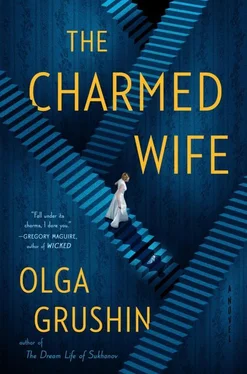The prince was frequently absent, traveling the land on matters of state, and when back in the palace, he continued to stay in his private quarters: he worked long hours and professed himself reluctant to disturb her rest. Yet whenever they chanced to be together, he was unfailingly attentive. On their third anniversary, ever grateful, she reflected on their matrimonial harmony. There had not been a single disagreement, not a single harsh word exchanged between them in all three years—nothing less than perfect, in fact, that she could recall, apart from, perhaps, one entirely insignificant misunderstanding some months before, which had stayed in her memory for the sole reason that it demonstrated, yet again, Prince Roland’s forgiving nature.
Sometime in the course of her solitary rambles through the palace, she had discovered an unfrequented passage in the east wing that dead-ended in a curious tapestry, so old and faded it was impossible to tell exactly what it depicted. When a shaft of sunlight pierced a nearby stained-glass window and the air in the corridor grew briefly bright, she thought she could discern blushing youths out for a stroll or ladies strumming delicate lutes; most of the time, though, the image remained shapeless and gray, with one puzzling dash of threadbare red in the middle. She felt drawn to the mystery and, hoping that one day the light would be just right for the meaning to reveal itself, paused here often on her way from the nursery.
One afternoon, as she neared the tapestry corridor, she heard a woman’s low laugh and a man speaking softly. She could make out no words, but something about the urgent yet amused tone of the man’s voice froze her in her tracks. She listened intently—and then knew the voice to be that of Prince Roland, though not as she herself had ever heard it. Her blood quickened as she braved the corner, expecting to see she knew not what; but there was nothing, there was no one there, only the faded old tapestry hanging still and inscrutable against the stone wall.
That night, she sat opposite the prince at a long, elaborate table. The dinner was held in honor of the Duke and Duchess von Lieber, visiting from a neighboring kingdom, and as a special compliment, Arbadac the Bumbler, the court magician, had enchanted all the courses to match the unusually intense green of the duchess’s eyes. The results proved rather unappetizing, however, and she found her throat closing up at the procession of bright green venison steaks and bright green loaves—or perhaps it was her lingering sense of unease that made her unable to eat. On her right, the jolly duke was telling her some interminable hunting story with much enthusiasm and spittle, shouting “Bam!” in imitation of every shot, slamming his hand vigorously against the table, so that bright green potatoes on his plate jumped. She smiled and nodded and tried to watch the prince at the other end of the hall, but his face was obscured by the many smoking tureens and made shimmery by the many wavering candles between them and she could not catch his eyes all night.
After the poisonously green pears had been cleared away, the guests turned to her, expecting her to give the customary signal of the dinner’s conclusion. Making up her mind, she stood and crossed the hall instead. The prince, ever the polite host, was listening to the Duchess von Lieber, who prattled with animation, the woman’s small, pretty, slightly monkeylike face liberally sprinkled with velvet beauty marks, the woman’s eyes every bit the shade of an unripe pear.
She placed a quavering hand on the prince’s shoulder.
“Darling, I’m sorry to interrupt, but what were you doing in the east wing’s second-floor corridor this afternoon?”
She tried to speak softly, but the room had grown quiet and her words carried. She sensed the duchess’s astonished gaze upon her.
“An east-wing corridor, my love? But I haven’t set foot in the east wing all day. I was working in my office until they rang for dinner.” He smiled at her. “And now, my precious dear, would you please escort the honored duchess to the after-dinner tea?”
He spoke with his habitual kindness, and instantly she saw that she had indeed been mistaken, that the voice in the corridor, whatever it had been, had sounded nothing like this civilized, gentle voice, the voice of her husband. And then she heard the whispering behind her back, and understood that she had broken the courtly etiquette with her impulsive, childish question, had embarrassed her dear prince in front of all these foreign dignitaries. The prince, seemingly at ease, motioned for everyone to rise, and the awkward silence broke, filled with the scraping of two dozen chairs, the shuffling of four dozen feet. Still, she felt flustered and could not quite recover her poise during the ladies’ tea that followed, even as she played a conscientious hostess to the chatty duchess. But later that evening, she sat by Angie’s crib, singing a bedtime lullaby, when the prince paid an unscheduled visit to the nursery. He kissed them both tenderly, bounced the child on his knee, asked about her day. He did not allude to her faux pas at dinner, but his gestures, his words, were full of loving reassurance, and at last she was able to see the unfortunate episode for the trifle it had been. She looked at the two of them, her kind, considerate husband, her daughter giggling in her father’s arms, and thought: This moment, right here, right now—I want to hold this moment perfect and whole in my memory, so that even decades from today I will be able to see it, undimmed, undiminished, and know just how lucky I was.
• • •
The night. The crossroads. The cauldron. The witch. The fairy.
The witch and the fairy are snarling at each other.
“You can’t interfere, you bully, you must let her make her own choices!”
“ You are the bully here, taking advantage of the poor darling in her fraught state! I am only helping her see the truth. Love will always triumph in the end. But I don’t expect you to understand, you bitter old prune, no one has ever loved you, no wonder you hate all men.” The fairy godmother faces me, her hands clasped in supplication. “I beg you, sweet child, cease this rash foolishness. Let me take you back where you belong, back to your happy marriage.”
“Two or three happy years don’t yet a happy marriage make,” interrupts the witch.
“Well, of course, one must be a bit more flexible after a decade together,” the fairy godmother admits, somewhat deflated. “Marriages are work.” She makes a visible effort to rally. “Still, whatever happened later, my child, I’ll help you move past it. The important thing is, you and the prince had such love between you once. You just need to keep the memory of that beautiful beginning alive in your heart.”
She has a gift, it seems, for saying precisely the wrong thing.
I am newly seared with anger.
“Does anything other than platitudes ever come out of her mealy mouth?” the witch asks with disdain. “Just throw in the lot and be done with it, madam.”
“No, child, no!” the fairy godmother wails. “Think of your little angels if nothing else! They need a wholesome family, they need their father!”
And just like that, the long-forgotten vision of Roland with little Angie laughing on his knee thrusts itself, unbidden, vivid, into my mind.
My fury is dampened. I look down at my hands.
One, three, five, eight, ten. And a half. Ten and a half hairs left.
Perhaps I should count again, just to be sure.
“Well, what are you waiting for, madam? You still want him dead, do you not?”
I do, indeed I do; but my daughter’s laughter continues to sound in my ears, guileless and carefree like her very childhood, which I want to protect with all my heart—which I am trying to protect, in truth, by doing this.
Читать дальше












